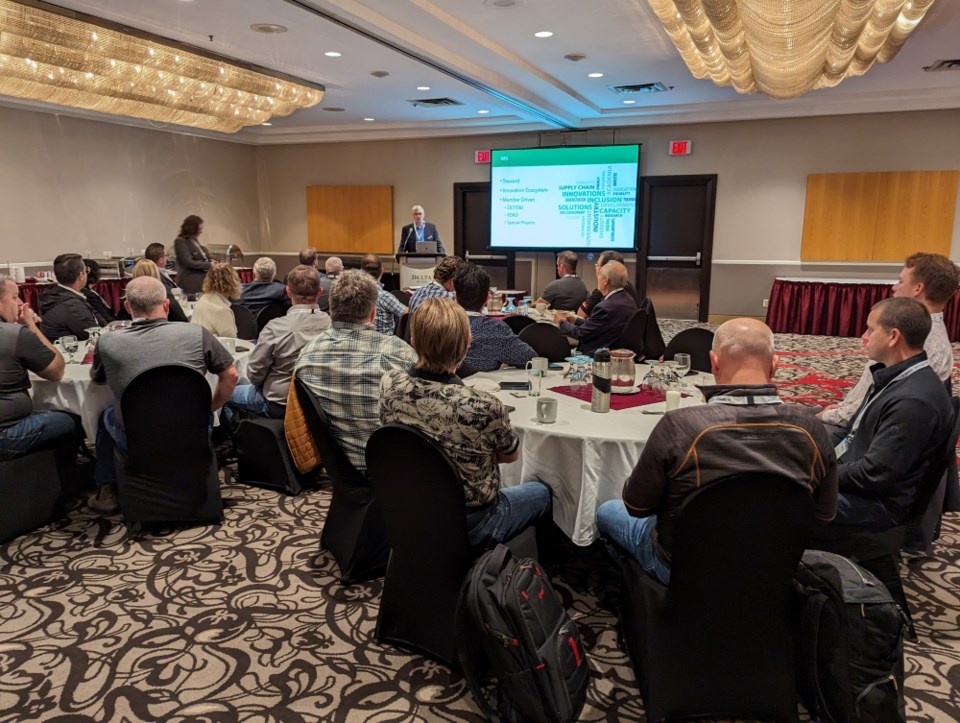REGINA - About 30 people from the mining and oil and gas industries attended an event co-hosted by the Southeast TechHub out of Estevan, the Saskatchewan Industrial and Mining Suppliers Association (SIMSA) and the International Minerals Innovation Institute (IMII).
The event held on Oct. 5 at the Delta Hotel in Regina focused on small modular reactors' (SMR) supply chain and mining innovation. At the event, suppliers to the southeast's oil and gas industries could learn about the opportunities to turn their abilities and skills to meeting the innovation needs of the province’s minerals industry and to become suppliers to future SMRs.
One of the speakers was Al Shpyth, executive director of the IMII, who provided examples of some of the technology development needs that exist in Saskatchewan’s minerals industry, and how the IMII may be a pathway for oil and gas suppliers to bring their innovative technologies to the attention of the minerals industry.
The other speaker was James Bulmer, SIMSA’s industrial concierge, who spoke to the potential for Saskatchewan companies to become part of the supply chain to support the adoption of SMRs in the province.
Gord More, the executive director of Southeast TechHub, said people who joined the event were from all over Saskatchewan, with a good representation from the southeast.
"It was a good conversation ... about the industry, [in which] we provided them information on how they can be a part of the SMR supply chain," said More.
"The event was about two things. One with regards to the small modular reactors was about how industries and companies within Saskatchewan or southeast Saskatchewan can be a part of the supply chain. And the other was about the opportunities for those in the oil and gas industry, in mining, because there's a real innovation need there as well."
The SMR presentation provided the industry with another piece of information, which is constantly evolving as more progress is made with the technology in the country and more details become available.
"We provided some lists of parts that are needed. And a lot of people realize from seeing these parts listed that there were things that they already build or supply for oil and gas. And also, some of the parts, they realized that they could make," More said. "We're still waiting to receive an official breakdown of exactly what is needed because there are still a few more steps. But I think that was really good.
"And we also talked about the CSA certification needed, provided some of that information, and explained how Ontario Power Producers have said that around 70 per cent of the parts needed for the SMR will not need to be nuclear certified," he added.
He pointed out that one of the points outlined during the event was that the SMR supply chain currently discussed is something that should start now, and continue into the potential Estevan SMR project, expected to be built in the late 2020s-early 30s.
"GE Hitachi wants people to be part of the supply chain for the SMR that's currently being built in Ontario. So people in the industry can take part now and also can get ahead of the game," More said.
The presentation was informative, but More said the main feedback was that people wanted more information, which is being provided by SIMSA. The TechHub will continue working with the southeast industries as well, to help them in any way they can, and will host more events in the new year. But the final decision about the area's future will be up to the people, More said.
"It's really up to the community. We have an opportunity to make a lot of money and be a part of the new nuclear energy right now. I can provide all these conversations and presentations and bring information into the community. But at the end of the day, the community must make its own choice and decide if it wants to make money and diversify its economy by using nuclear energy," More said.
"There is a lot of positive energy towards Estevan and southeast Saskatchewan being a part of that. But it's up to us to decide and do the next steps on our own.
"I'll keep providing all this information. But people need, on their own, to decide if they want a part of this money."
For more information about Southeast TechHub's upcoming events keep an eye on their website at estevanhub.ca.





